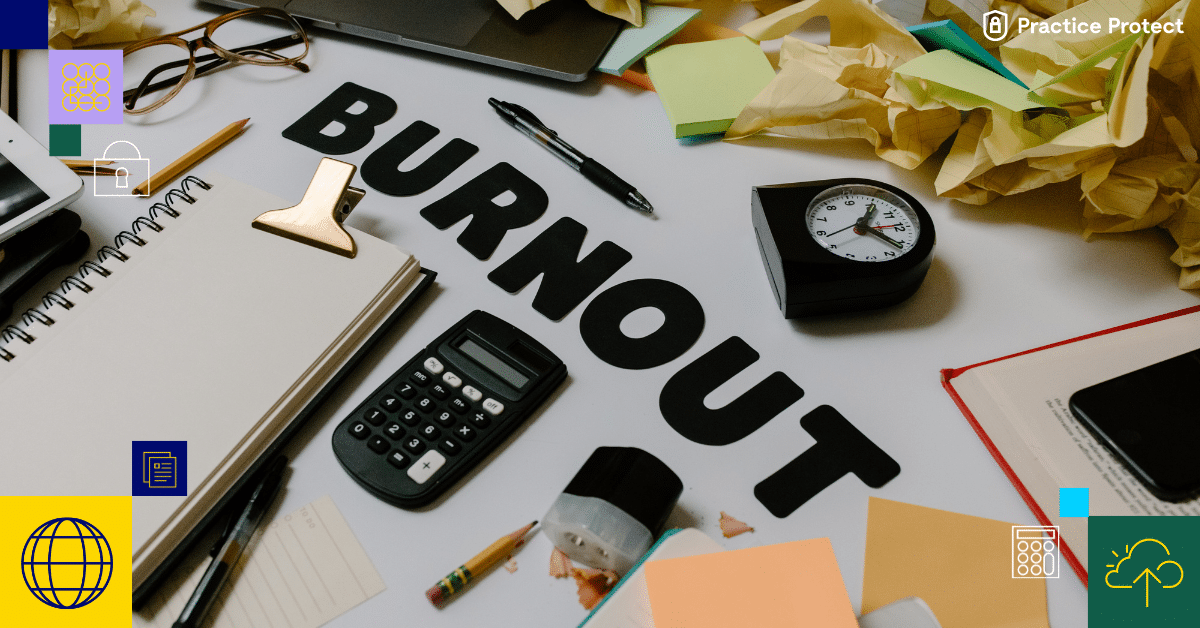Preventing Burnout in Accountants During Tax Season: Tips and Strategies

Tax season is often a whirlwind of stress, deadlines, and endless paperwork for accountants. It’s no wonder burnout has become a real threat during this hectic period.
Whilst a little offbeat of our usual cybersecurity content, today we are diving into tips to try and keep burnout away this Australian tax season.
Understanding Burnout and Its Impact
Burnout is more than just feeling tired; it’s a state of chronic physical and emotional exhaustion. For accountants, this can manifest as reduced efficiency, lack of motivation, and even physical symptoms like headaches or insomnia. It is a serious medical condition which should be treated rather than ignored until it is too late, and you need some serious time off work to recuperate.
Recognizing the signs early can make a big difference in managing and preventing burnout.
1. Prioritize Time Management
Effective time management is crucial during tax season. With a packed schedule, it’s easy to get overwhelmed. Here are some tips to help:
- Set Clear Goals: Break down tasks into manageable chunks and prioritize them. Use a daily to-do list to keep track of your progress and stay focused. Sometimes the act of crossing off an easy, mundane task can help give you a small boost of serotonin to help you keep going through the seemingly endless work.
- Use Technology: Leverage tools and AI technology to help you do your job better, faster and with a lot less pain. There is a wide raft of tools out there focused on trying to make the accounting workflow easier and faster – do not hesitate to use them!
- Delegate Tasks: Don’t be afraid to delegate responsibilities to your team. Understand that you can’t do everything alone. Delegation can free up your time to focus on more critical tasks. It is hard to staff-up for tax time when you don’t need all these bodies year-round, do not hesitate to delegate tasks, or even drop certain tasks during this season that aren’t critical to running the business – it is okay to let some things drop!
2. Maintain a Healthy Work-Life Balance
It’s tempting to work around the clock to meet deadlines, but this approach is unsustainable. Here’s how to maintain balance:
- Set Boundaries: Define specific work hours and stick to them. Communicate these boundaries with colleagues and clients to manage their expectations. A burnout accountant is not helpful to anyone when they cannot focus; don’t feel like you must be a superhero all the time.
- Take Breaks: Regular short breaks can boost productivity and reduce stress. Follow the Pomodoro Technique by working for 25 minutes and then taking a 5-minute break.
- Unplug After Work: Disconnect emails and calls from work during your off-hours. Use this time to relax and recharge, ensuring you’re fresh for the next workday.
3. Foster a Supportive Work Environment
A supportive work environment can significantly reduce stress levels. Encourage open communication and collaboration within your team:
- Regular Check-ins: Schedule regular team meetings to discuss workloads and concerns. This keeps everyone on the same page and allows for early detection of potential burnout signs. It is good to have a visualization of everyone’s workload so collectively everyone can see how much work there is and not get resentful that they feel someone is shouldering their load.
- Provide Resources: Offer access to stress management resources, such as counseling services. Employee assistance programs (EAPs) can provide professional support when needed. There are many organizations out there who specialize in this area, even if this may not be in budget, tell staff of free helplines in case they don’t feel like they can share their stress at work.
4. Practice Self-Care
Self-care isn’t just a buzzword; or for the Instagram crown, it’s essential for maintaining mental and physical health. Here are some self-care practices:
- Stay Active: Incorporate physical activity into your daily routine. Even a short walk or quick exercise session can boost your mood and energy levels. Take a lunch break and go for a walk outside the office, it can help refresh your mind.
- Healthy Eating: Fuel your body with nutritious foods to maintain energy levels. Avoid relying on caffeine and sugar, which can lead to energy crashes, although we admit they are sometimes needed, try not to make this your go to energy booster.
5. Recognize and Celebrate Achievements
Acknowledging accomplishments, no matter how small, can boost morale and motivation:
- Celebrate Milestones: Recognize individual and team achievements with small celebrations. Whether it’s a team lunch or a simple shout-out in a meeting, these moments matter.
- Positive Feedback: Provide constructive and positive feedback regularly. This reinforces good performance and keeps morale high.
- Reward Systems: Implement a reward system for meeting deadlines and goals. Incentives like gift cards or extra time off can be great motivators if this is something the firm can afford.
Burnout doesn’t have to be an inevitable part of tax season for accountants. By prioritizing time management, maintaining a healthy work-life balance, fostering a supportive work environment, practicing self-care, investing in professional development, and celebrating achievements, accountants can navigate this busy period with resilience and efficiency. Remember, taking care of yourself is just as important as taking care of your clients.

